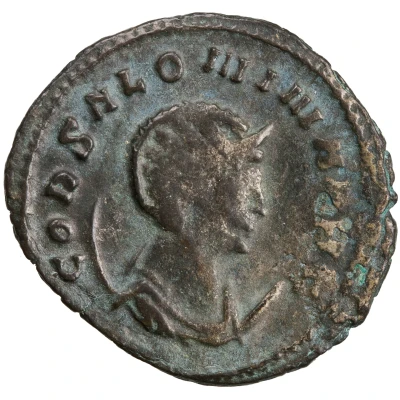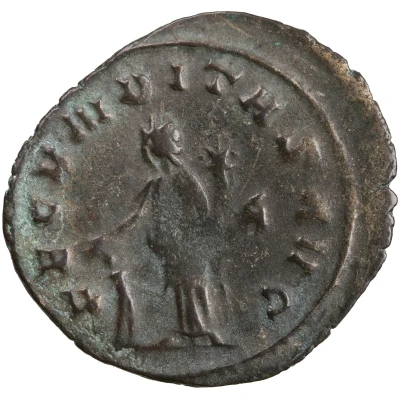Antoninianus - Cornelia Salonina FECVNDITAS AVG; Fecunditas
| Silver | - | - |
| Issuer | Rome › Roman Empire (27 BC - 395 AD) |
|---|---|
| Empress | Cornelia Salonina (Julia Cornelia Salonina) (254-268) |
| Emperor | Gallienus (Publius Licinius Egnatius Gallienus) (253-268) |
| Type | Standard circulation coin |
| Years | 260-268 |
| Value | Antoninianus (1) |
| Currency | Antoninianus, Reform of Caracalla (AD 215 – 301) |
| Composition | Silver |
| Shape | Round (irregular) |
| Technique | Hammered |
| Demonetized | Yes |
| Updated | 2024-10-05 |
| Numista | N#289629 |
|---|---|
| Rarity index | 97% |
Reverse
Fecunditas, draped, standing right, holding cornucopiae; at her feet, two children.
Scripts: Latin, Greek
Lettering:
FECVNDITAS AVG
-/-//Δ
Translation:
Fecunditas Augustae.
Imperial fertility.
Comment
Source:Online Coins of the Roman Empire (OCRE)
Interesting fact
The Antoninianus coin featuring Cornelia Salonina was issued during the reign of Emperor Gallienus, who ruled the Roman Empire from 260 to 268 AD. The coin's design features a portrait of Cornelia Salonina, the empress, on the obverse (front side), and an image of Fecunditas, the Roman goddess of fertility, on the reverse (back side). The coin was made of silver, which was a valuable and highly sought-after metal at the time. Interestingly, the coin's design was meant to promote the idea of fertility and abundance, which was an important theme during Gallienus' reign. The emperor was known for his efforts to restore the Roman Empire's economy and military strength, which had been weakened by previous wars and internal conflicts. By featuring Fecunditas on the coin, the Roman government was emphasizing the importance of fertility and prosperity for the empire's future success. Overall, the Antoninianus coin featuring Cornelia Salonina is a fascinating piece of history that provides insight into the cultural and economic values of the Roman Empire during the 3rd century AD.

